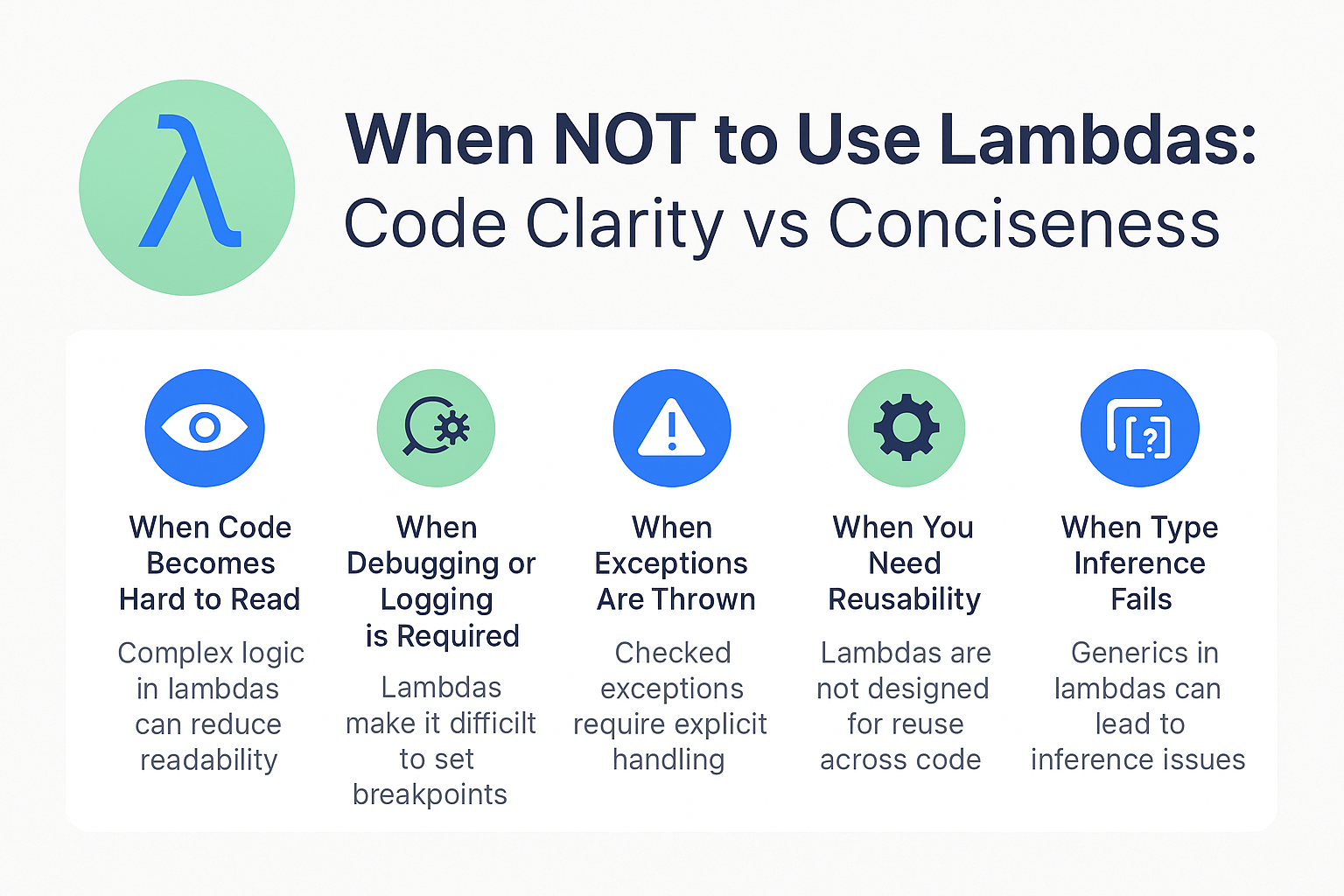Java lambda expressions bring powerful conciseness and flexibility to modern code. But they aren’t a silver bullet. Overusing or misusing lambdas can lead to cryptic logic, debugging nightmares, or performance issues.
In this tutorial, we'll explore situations where not using lambdas leads to clearer, safer, and more maintainable code. We'll examine real-world examples and help you find the right balance between brevity and clarity.
🔍 What Are Lambdas in Java?
Lambda expressions are a Java feature (since Java 8) that allows you to write instances of functional interfaces in a compact way. They support a functional programming style by allowing behavior (functions) to be passed as data.
// Example of a lambda expression
Runnable r = () -> System.out.println("Hello!");
They are most commonly used with the java.util.function package and the Streams API.
🚫 When Lambdas Should Be Avoided
1. When Code Becomes Hard to Read
list.sort((a, b) -> a.getName().compareToIgnoreCase(b.getName()));
✅ This is fine for simple logic.
But if the logic becomes longer or more complex:
list.sort((a, b) -> {
int scoreCompare = Integer.compare(b.getScore(), a.getScore());
if (scoreCompare == 0) {
return a.getName().compareTo(b.getName());
}
return scoreCompare;
});
❌ This is better as a named comparator class.
2. When Debugging or Logging is Required
You cannot place breakpoints inside lambda bodies easily. This can make debugging very tricky.
stream.filter(p -> {
System.out.println("Checking: " + p);
return p.isActive();
})
Better: move logic into a method or named class.
3. When Exceptions Are Thrown
Lambdas do not handle checked exceptions gracefully. You must wrap them manually, leading to noise.
stream.map(file -> {
try {
return readFile(file);
} catch (IOException e) {
throw new RuntimeException(e);
}
})
Prefer using helper methods or refactoring to catch exceptions clearly.
4. When You Need Reusability
Lambdas are inlined and cannot be reused unless explicitly stored.
Predicate<String> isLong = str -> str.length() > 10;
Better to move to a method or constant if reused across multiple places.
5. When Type Inference Fails
Map<String, List<String>> map = new HashMap<>();
map.computeIfAbsent("key", k -> new ArrayList<>());
Sometimes, more complex generics can lead to confusing type inference errors.
📌 What's New in Java Lambdas?
Java 8
- Introduced lambdas and Streams API
java.util.functionpackage (Function, Predicate, Supplier, Consumer, etc.)
Java 9
Optional.ifPresentOrElse()- Stream improvements
Java 11
varin lambda parameters
Java 17
- Pattern matching preparation
- Sealed interfaces with functional types
Java 21
- Virtual threads (Project Loom) + lambdas
- Structured concurrency using lambdas
- Scoped values: thread-local-like constructs
💡 Common Anti-Patterns
- Excessive chaining:
stream.filter(...).map(...).flatMap(...).reduce(...)with nested lambdas - Lambdas hiding business logic
- Wrapping exceptions poorly
- Lambdas with side effects
🔄 Method References vs Lambdas vs Anonymous Classes
| Style | Use Case | Pros | Cons |
|---|---|---|---|
| Lambda | Short inline logic | Concise | Can become unreadable |
| Method reference | Reuse existing method | Clearer | Only works for existing methods |
| Anonymous class | Complex logic or state | Full power of class | Verbose |
🔐 Thread Safety & Performance
- Lambdas are not inherently thread-safe
- Avoid shared mutable state inside lambdas
- Method references may offer better performance in hot paths (JVM optimizations)
✅ Functional Patterns with Lambdas
- Strategy: Pass different behaviors
- Command: Represent actions
- Observer: Subscribe via consumers
Example:
Consumer<String> logger = msg -> System.out.println("[LOG] " + msg);
logger.accept("App started");
🤝 Spring Integration Example
@Bean
public CommandLineRunner init(MyService service) {
return args -> service.runStartupTasks();
}
📚 Real-World Use Case: File Filtering
File[] txtFiles = dir.listFiles(f -> f.getName().endsWith(".txt"));
This is clean and perfect for lambdas. If filtering logic is complex, use a separate method or class.
🧠 Conclusion and Key Takeaways
- Use lambdas for simple, short logic.
- Avoid lambdas when readability, reuse, or debugging is important.
- Method references and named classes are your allies.
- Use lambdas judiciously, not reflexively.
❓ FAQ
Q1: Can I use lambdas for exception handling?
Only with unchecked exceptions or with helper wrappers. Checked exceptions are painful in lambdas.
Q2: What’s the difference between Consumer and Function?Consumer<T> accepts a value and returns nothing. Function<T, R> accepts a value and returns another.
Q3: When should I use method references over lambdas?
When you're simply calling an existing method—method references are more readable.
Q4: Are lambdas garbage collected like normal objects?
Yes, lambdas are GC’d just like any object, but JVM may optimize with hidden classes.
Q5: How does effectively final affect lambda behavior?
Lambdas can only capture variables that are final or effectively final (not reassigned).
Q6: Can lambdas capture loop variables?
Yes, but be careful with variable scope inside loops—Java captures the variable, not the value.
Q7: Are lambdas faster than anonymous classes?
Often yes, but it depends. JVM may optimize lambdas better via invokedynamic.
Q8: Can I assign a lambda to a variable?
Yes, as long as it matches a functional interface.
Q9: Should I use lambdas for logging?
Only for simple log messages. Complex logic or conditions may be better as a method.
Q10: Can lambdas implement multiple interfaces?
No, a lambda corresponds to a single functional interface.
